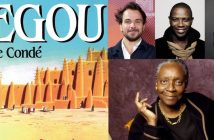Keeping to the narrative style of The Wanderers and The Dove’s Lost Necklace, Nacer Khemir makes a staggeringly beautiful film, as fascinating as it is disorienting. We are easily lost in this maze as narratives intertwine and the story takes on the meaning we want it to have, but we accept so readily because it takes us to a world where poetry transcends realism. It would be a shame to only see in it a drug made to satisfy the latent orientalists within us all: this appeal to dreams restores the relevance of imagination in thoughts, that of opening the doors of possibility to go beyond reason and law, which limit destiny.
The storm that opens the film is familiar: it represents the loss of our points of reference in a world where « even dunes have moved », as Ishtar, who accompanies the old blind dervish Bab’Aziz (= grandfather), points out. They cross the desert to attend the great reunion of dervishes that only takes place every thirty years. Ishtar offers the vital viewpoint of childhood; Bab’Aziz that of a man at death’s door, this « wedding to eternity ». Their exchange is initiatory: « When you talk, it’s not so cold », Ishtar says to prompt him to tell a story. For they communicate with this language that teaches you to « look with your heart’s eyes ». In the desert, there are no maps, no predefined paths: one finds one’s way by walking and singing, perhaps because searching matters more than finding. The great reunion of dervishes is not an end in itself: instead of a dramatic climax, it is the place where Bab’Aziz passes to a new level in the great movement of life. The one who covers his remains with sand recalls that the unborn child does not know the beauty of the world and that this is still true when facing death.
While walking, Ishtar and Bab’Aziz meet people. All are looking for something: meaning, a beloved, justice
Each tell their story, like in One Thousand and One Nights, the story that saved Scheherazade’s life because, at dawn, it is never finished. The film also embeds narratives: a character they meet tells a new story with new characters, etc. Thus, it is more a poetic canvas than a succession of events; the film spins like the whirling dervish of its opening scenes in a spiral where everything is linked by a unique theme: love. A man on a motorbike follows a prince on a horse, an oasis city springs up from the desert sands, the young lad and the old man make one, and the invisible overrides the visible
Everything is muddled up and put back in place according to another logic where hallucinations and reality intertwine. Time is mixed like the narratives, in such a way that the continuity evoked is more a reference to man’s perpetual renewal than to a linear or predefined destiny. Doesn’t the Sufi vision play on the illusion of senses to define the unity of existence?
If one had to remember but one line, the film highlights it: « There are as many paths that lead to God as men on Earth ». Why, then, imprison Islam and Arabs in a simplistic and ossified image? The discrepancy is permanent. Even clothes are stylized. You cannot grasp reality without changing your state of mind; you cannot understand a people without listening to it. « The one we think is made is not necessarily the mad one »: this age-old culture, says the film, is the opposite of a fundamentalist bent. Its contemplative tradition is centered on the sensitive experience of love. Instead of a closed identity, it offers a thousand facets. Shot in Tunisia and Iran, the film mixes Persian, Arab and other languages, but the characters understand each other because they speak the same spiritual language and communicate with body language. In the same way that intellectuals from opposed people communicate without translation in Godard’s Notre musique.
Osman throws himself down the well to find his beloved and the prince cuts himself off from the world by contemplating his soul in the spring that the gazelle leads him to: doesn’t this culture also carry the burden of its difficult position in a modern world where everything is dictated by Western utilitarian and consumerist universalism? It is thanks to the continuity and complexity of a spiritual quest that has always been centered on love, and not to a reactionary withdrawal into a set identity, that it will resist the steamroller of globalization, find its dignity again and guide the world, Nacer Khemir seems to say through the multiplication of symbols, references and visions. The film’s puzzle is put together thanks to the character of Bab’Aziz. A vision is thus imposed: the essential quest for all, from the North to the South, for a meaning of life that draws from love and the great movement of the world’s order.








